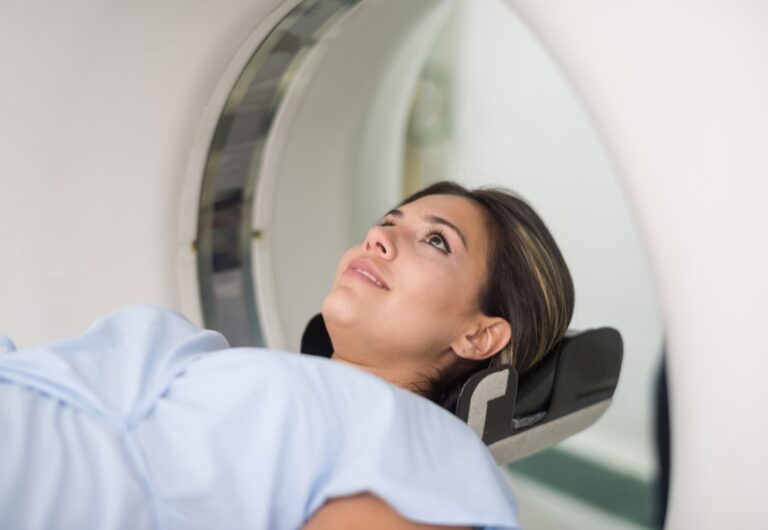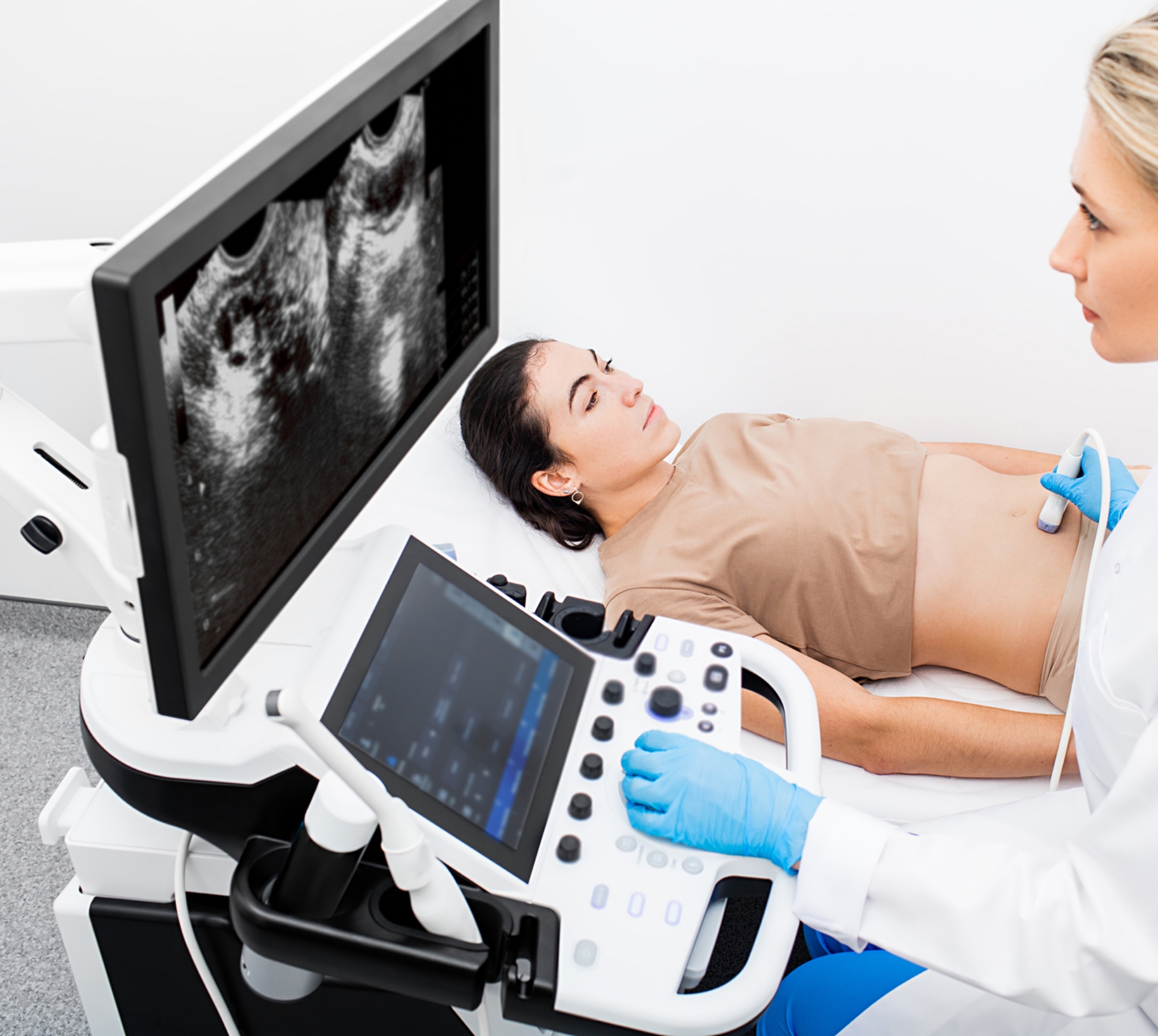Diagnostic Testing to Evaluate Your Fertility
A sonohysterogram (or “saline sonogram”) is used to evaluate the inside of your uterus to reveal abnormalities like polyps, fibroids, or scar tissue that may inhibit your chances of getting pregnant.
We also perform sonohysterograms in the case of abnormal uterine bleeding and prior to an In Vitro Fertilization (IVF) cycle to make sure there are no abnormalities that would interfere with an embryo implanting.
Here’s how it works: Your doctor will instill sterile saline inside your uterine cavity with a thin, flexible tube. We’ll then perform a transvaginal ultrasound. The uterine walls normally touch each other, but the placement of saline expands the inside of the uterus, allowing us to see anything that may be protruding into the otherwise collapsed uterine cavity. For this reason, a sonohysterogram gives us far more information than a transvaginal ultrasound alone.
If your sonohysterogram is performed before an IVF cycle, we typically perform a mock embryo transfer at the same time to gather necessary information about the anatomy of your cervix and uterus before the actual embryo transfer. Typically, a sonohysterogram is not painful and does not require any pain medication.
Hysteroscopy is a procedure in which a tiny camera is inserted through the cervix into the uterus to allow for direct visualization of the inside of your uterine cavity. Depending on ultrasound findings or past medical history, your physician may recommend a hysteroscopy instead of a saline sonogram, as it is a highly accurate method of evaluating the inside of the uterine cavity.
Your doctor will use a small, flexible hysteroscope, which allows us to perform the procedure in our clinic without IV sedation. If we administer some pain medications before the procedure, we require that you bring someone to drive you home after the appointment. Flexible hysteroscopy is a diagnostic procedure only. If we find any abnormalities, we will perform a subsequent operative hysteroscopy at a later date using a larger instrument.
An endometrial biopsy is a procedure that involves removing a small sample of the lining of the uterus (endometrium) for examination.
Your doctor will begin by inserting a speculum into your vagina to view your cervix more clearly. After using a solution to clean your cervix, your doctor will insert a thin suction tube past your cervix and into your uterus to collect a tissue sample. This sample will be sent to a pathologist, who will examine the tissue under a microscope to determine if you have any underlying conditions that may be contributing to infertility (such as endometritis). This information helps to guide your treatment plan.
An endometrial biopsy is fast, usually taking less than one minute. The procedure may cause some discomfort, similar to menstrual cramps, which may persist for a few hours. Over-the-counter pain relievers like ibuprofen or acetaminophen can help relieve the pain.
This test uses x-ray imaging to indicate any damage or blockages in your fallopian tubes. It can also highlight the shape of the uterus. Radiopaque dye is injected into your uterus, which then travels up through the fallopian tubes and spills out into the abdominal cavity. As this test may be uncomfortable, it is recommended to take 400-800 mg of Ibuprofen approximately one hour prior to the procedure.
A Pelvic MRI (Magnetic Resonance Imaging) is a non-invasive imaging test used to evaluate the reproductive organs. An MRI can provide detailed images of the uterus, ovaries, and other pelvic organs, which can help diagnose a range of conditions that may be contributing to infertility. Such conditions include mullerian duct anomalies, fibroids, adenomyosis (a condition in which the inner lining of your uterus breaks through the muscle wall of the uterus), endometriosis (endometrium-like tissue that grows outside the uterus, causing inflammation), and tubal disease.
The test is performed using a strong magnetic field and radio waves and does not involve any radiation exposure. During the test, you will lie on a table that slides into the MRI machine, which will take detailed images of the pelvic area. The test is generally well tolerated and takes 30 to 60 minutes. An MRI can be an important tool in the evaluation of infertility and can provide valuable information to guide your treatment plan.
A semen analysis is a simple, straightforward test that can provide important insights into a man’s ability to conceive. It involves analyzing a semen sample to assess the number, shape, and movement of sperm.
A semen culture is a test that checks for any potential infections in the semen. The test involves testing a semen sample for bacteria to determine if there are any harmful microorganisms present that could be impacting fertility. Additionally, a semen culture will determine the presence of bacteria in the semen that could contaminate the media during the culturing of the embryos in the laboratory at the time of IVF treatment.
The Sperm Chromatin Structure Assay (SCSA) is a test used to evaluate the quality of sperm DNA. The test measures the integrity of the sperm’s genetic material and can provide important information about a man’s fertility potential. The SCSA is performed by collecting a semen sample and analyzing it in the laboratory. The sample is then evaluated for any DNA damage or fragmentation, which can impact the development of the embryo and is associated with poor reproductive outcomes. High DNA fragmentation may be a result of many factors including, but not limited to, disease, diet, drug use, high fever, elevated testicular temperature, environment, air pollution, cigarette smoking, and advanced age.
Laboratory Tests
As part of your comprehensive fertility evaluation, we also perform a range of laboratory tests to assess your fertility and screen for communicable diseases. These tests provide important insights into your overall reproductive health and can help guide your personalized treatment plan.

Hormone Testing
Hormone testing is a critical component of a comprehensive fertility evaluation. It’s a simple yet essential step toward starting your family.
By measuring the levels of various hormones in your body, we can gain important insights into your reproductive health. Hormones play a crucial role in regulating your menstrual cycle, ovulation, and fertility, so it’s important to understand their status. For example, we will test the levels of Anti-Mullerian Hormone (AMH) and the levels of Estradiol (E2) and Follicle Stimulating Hormone (FSH) on the third day of your cycle to evaluate your ovarian function.
Hormone testing is performed with a simple blood draw, and the results can provide valuable information. If you’re experiencing difficulty getting pregnant, talk to your doctor about hormone testing and if it may be right for you. With the results in hand, your doctor can determine if there are any hormonal imbalances that need to be addressed and create a personalized treatment plan that addresses your needs.

Preconception Testing
Preconception testing is a critical step for those looking to start a family. It involves a series of tests designed to assess your overall health and fertility and to identify any potential issues that could affect your ability to conceive and carry a healthy pregnancy. Our team will work with you to create a personalized plan based on your individual needs and health history.

Fertility Education Center

Fertility Treatments and Your Lifestyle
The lifestyle you lead directly affects your fertility. From making healthy lifestyle choices to supplementing your intake of important nutrients, here are some key steps you can take outside the clinic to improve and maintain your chances of becoming pregnant.
Let’s Take the Next Step Together
Our skilled fertility specialists are here to help. Contact us today and let’s discuss the next phase of your fertility journey.






